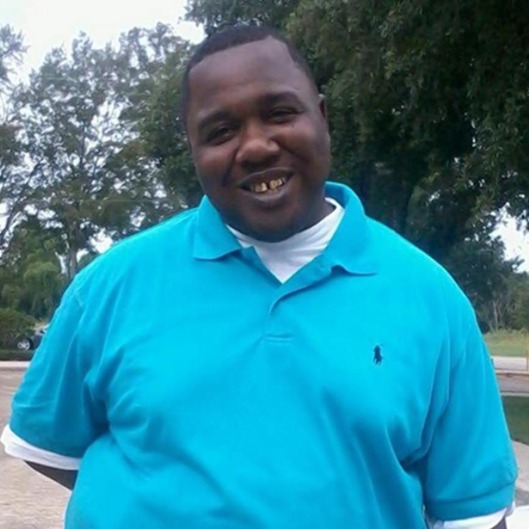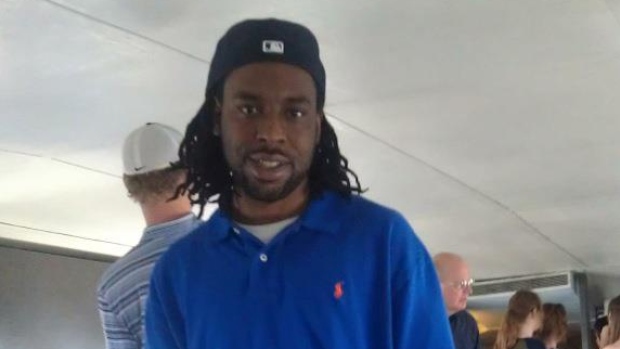On Tuesday July 6, Alton Sterling was selling CDs as he had for many years outside of the Triple S Food Mart in Baton Rouge, LA. At some point, two white cops arrived, possibly in response to a 911 call from a homeless man that Sterling had refused to give money to and had shown his (legal and licensed) gun to instead. Alton Sterling’s friend Abdullah Muflahi saw the two officers talking to Sterling, and then pulled a phone out to start recording when he saw the officers, who have since been identified as Blane Salamoni and Howie Lake, taser Sterling and tackle him to the ground. Muflahi’s video captures Sterling being tackled as well as him being shot two times. After the recording stopped, Sterling was shot four more times for a total of six. Sterling died on the scene. Muflahi says that he and several other eyewitnesses were taken into custody and that police confiscated the store security footage without a warrant.

At the same time, unbeknownst to Muflahi or police, Arthur Reed, member of a group called Stop the Killing, had also recorded video. Reed’s group listens to police scanners and arrives on the scene of crimes to record in order to create media to deter young people from crime. This time, Reed caught Sterling’s death. He and Stop the Killing waited to see how the Baton Rouge police would handle it; when the department didn’t release any footage on their own (although Baton Rouge police use body cameras, the police department says that Lake and Salamoni’s fell off during their brief encounter with Sterling), and “after he heard that the police had accused Mr. Sterling of reaching for a gun,” Stop the Killing uploaded theirs to social media, where it quickly went viral.
Quinyetta McMillan, who has a 15-year-old son with Sterling, told the press “As a mother, I have now been forced to raise a son who is going to remember what happened to his father, that I can’t take away from him …I hurt more for him and his loss. As a parent, the greatest fear is to see your child hurt and know there is nothing you can do about it.”
The Justice Department has opened an investigation, although the power of that investigation, even if it does find wrongdoing, may be limited. As Imani Gandy at Rewire puts it, “the fact of the matter is that the DOJ is better at dealing with structural problems in a particular police department through “pattern or practice” cases than it is at prosecuting individual police officers for instances of excessive force or police brutality.” So far, Officers Lake and Salamoni (the latter of whom is son of a captain in the department) are on administrative leave.
Only a day later, on Wednesday evening, a video began circulating of a police officer in Falcon Heights, MN shooting Philando Castile at a routine traffic stop. Castile’s girlfriend, Lavish Reynolds, began recording on Facebook Live after their car was pulled over for a broken taillight with their young daughter in the back. In the video, Reynolds explains that she told the officer Castile had a legal license to carry a firearm and that Castile was going to reach into his pocket for his ID; when he did, the officer began shooting. The video shows Castile bloodied and slumped over in the passenger seat. Reynolds’ daughter can be heard comforting her from the backseat before the officer has Reynolds get out of the car and takes her into custody. At no point do the officers appear to call for medical aid for Castile, who later died in the hospital.

Reynolds has continued to speak out about her boyfriend’s death and her commitment to get justice for him. Castile’s mother, Valerie, has said in a series of interviews that she always emphasized with her son to comply with anything police asked: “‘Whatever they ask you to do, do it. Don’t say nothing,’” she advised him, adding, “So what’s the difference in complying and you get killed anyway?”
It’s been an incredibly traumatizing 24 hours in the midst of a deeply painful and dehumanizing month, year, century. Just on Monday, Delrawn Small was killed by an off-duty police officer in Brooklyn; a few days before that, Ronnie Shumpert was shot and mutilated by a police dog. There are almost certainly many more names that haven’t reached the media, that most of us won’t hear. Many people feel hopeless; many people feel angry, scared, exhausted and numb. Black American people are being publicly targeted for state violence, and in the coming days will also be the targets of interpersonal violence in many forms, including having explanations and justifications demanded of them, being bombarded with traumatizing videos and images, and having to interact with people who were able to immediately forget that these deaths have happened because they don’t consider them important, if they even knew about them in the first place. It’s a hard time and a good time to be gentle with each other, and if you aren’t Black, to decenter yourself and your thoughts and feelings on this, and instead to talk to members of your own community about the need for change.
Places to donate:
+ Scholarship Fund for Alton Sterling’s Family
+ Donate to Philando Castile’s family
+ Justice for Philando started by his sister
+ A roundup of where to donate for Black Lives Matter
Take Action
+ A thread by Ijeoma Oluo on what you can do locally.
+ Campaign Zero helps you find out where your representatives stand and help you demand action.
+ Beyoncé also helps you contact politicians.
Recommended reading:
+ Alton Sterling and When Black Lives Stop Mattering, Roxane Gay
+ Training Officers to Shoot First and He Will Answer Questions Later, by Matt Apuzzo
+ The Really, Really Racist History of Gun Gontrol in America, by Jane Coaston
+ Am I Going to Write About Murdered Black People Forever?, by Kara Brown
+ How to Be A Better Ally: An Open Letter to White Folks, from Meg Cramer
+ Black Exhaustion, by Pilot Viruet
+ American Horror Story, Ezekiel Kweku








Comments
Outraged and exhausted once again. After Orlando, I had false optimism that maybe America had learned its lesson, but apparently I was being naive. America needs to learn its lesson and punish racists VERY quickly or this will never stop..
Thank you for writing this. I know they are not queer women but as a Queer Black man myself, it is comforting knowing that some LGBT sites I visit are intersectional enough to discuss issues as such as these. Two days ago I was reading truly upsetting comments on other sites about BLM protesting Toronto pride and then these Executions on Videos came out and I felt really down. Sites like yours really make my day.
thank you Corte, i hope you’re taking care of yourself, i hope you can find more safe and healing spaces today and all days <3
Thanks for getting this up quickly, Rachel.
This is terrible.
Thank you for writing this. I saw people posting about Alton Sterling on Facebook, so I came to Autostraddle to find out what happened. So horrific.
Thank you for posting this. The Ijeoma link is one I’ve already posted everywhere I can–a lot of people don’t know specific steps they can take to work against this system of police brutality and she was so thorough in her steps for people to take.
Thank you for covering these deaths with sure care and sensitivity. The struggles of poc and lgbtq+ people are so connected. I haven’t had the energy yet to speak to white people about the past 24 hours, but when I do I will be speaking to my woke queer friends first.
It’s times like this that I find it best to stay off of mainstream public articles related to these incidents with comments sections, because if I had to respond to every clueless white person who claims that white privilege doesn’t exist, that everyone who expresses outrage over these clearly racist shootings is actually racist themselves, I’d go insane.
The comments sections make me mortified to be white. It’s like #straightpride. GFY.
<3
The Executions on video are brutal
My heart is breaking. I worry so much about your country and the amount of racism and violence. Please won’t someone in power do something!!!
I guess the right to bare arms only applies to cis white people, cause I don’t see the NRA fanatics trying to defend him, for having a gun. Even if he was reaching for his gun, that’s not fucking reason to shoot the guy. Cause aren’t most cops wearing bulletproof vests, and suppose to be trained on defusing situations where a gun maybe pointed at them?
This is horrifying. I felt almost numb at first but now its really hitting me. We are never safe. You can be gunned down in broad daylight by the people sworn to protect you and nothing will really change. I want to believe that these horrific cases will spark some kind of lasting change but I can’t even convince myself. There’s been so many cases that seemed open and shut yet somehow the people responsible weasel away from any real consequences.
there’s a huge amount of anti-blackness in the asian/asian american community especially now that there’s word that the cop who murdered Philando Castile was chinese. idk if im allowed to post links like this but i think its important to share this around for the asian members- esp if you have family members who are very anti-black (mine sure are)
its basically a starting letter trying to have our family/ourselves have greater empathy for black people. it’s still being edited and worked on, but its important. (and there are translations too for our immigrant family members whose first tongues are not english)
https://docs.google.com/document/d/10syOzyDfJfmw9Bg89cam8wj29sa_rJHoDXFbrhrFJLs/preview#
the way black people are treated in america is really horrific. i’m really sorry this is going on. its up to us (asian people) to combat the anti-blackness in our community so please share this letter around.
white people should know better than to share these traumatic videos but just in case here’s how to disable autoplay videos on your feed. Facebook settings > video > autoplay > never autoplay videos
https://www.facebook.com/chescaleigh/photos/a.282251585363.316318.131467505363/10157052712955364/?type=3&theater
My heart hurts so much for these families. I think many of us feel helpless and powerless against such hatred. For my part, I’m working hard to challenge racism among my loved ones, even when it’s uncomfortable and painful. I can’t be silent anymore.